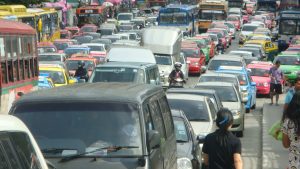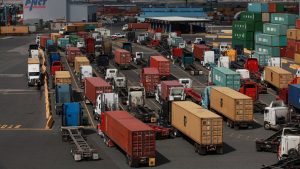Coronavirus Threatens One Million Trucking Related Jobs – On a bright morning early this week, Eugene Seroka, executive director of the Port of Los Angeles, gazed through the big picture window of his office at the sprawling docks below.
Where he would normally see as many as a dozen ships in the harbor with giant cranes hoisting one container of goods after another, just four had docked.
“It’s very quiet,” he said.
The nation’s largest port is hurting. That may be a leading indicator of the pain that’s in store for Southern California and the U.S. economy as businesses hunker down to deal with the rapidly expanding new coronavirus.
Many American companies had bulked up inventories last year in advance of the Trump administration’s steep tariffs on Chinese imports, and have plenty of goods on hand. But they could soon face serious consequences of the virus: a dearth of crucial parts for American factories, shortages of consumer products on store shelves and less demand for U.S. exports.
RELATED: Trucking Industry Reacts To Coronavirus
Trade with China normally accounts for roughly half of the containerized goods flowing through the twin ports of Los Angeles and Long Beach. Now, with Chinese factories operating at about 40% of capacity, business at the San Pedro Bay complex is dwindling.
The two ports project a 15% to 17% plunge in cargo volumes in the first quarter of this year, as compared with the first three months of 2019 — a drop of more than 500,000 container units.
Imports usually slow around the Chinese New Year, but shippers have canceled 60 vessel sailings for the first quarter of this year —nearly twice the normal number. The 12 terminals across the two ports have been shutting down for days at a time.
“The overall impact is not only on the regional economy, it is on the national economy,” said Mario Cordero, executive director of the Port of Long Beach. “We are ground zero for Asian imports. We were already down because of the trade war. With the coronavirus, we’ve gone from uncertainty to potential chaos.”
In the Los Angeles region, the pain is already acute. Seroka pointed out that 1 in 9 Southern California jobs are tied to the ports, including people who work on the docks, drive trucks and move boxes in warehouses.
“That’s a million jobs,” he said. “Less cargo means fewer jobs. The truck drivers are not pulling as much freight. The longshoremen are not being called out to work as frequently as they normally would be.”
At a time when job growth is already slowing in California — after a decade of expansion — the coronavirus threatens to make things worse.
On the docks, work shifts are down by a fifth in the first 10 weeks of this year, compared with 2019, according to the Pacific Maritime Assn., an industry trade group, although the trade war and competition from East and Gulf Coast ports are also factors.




